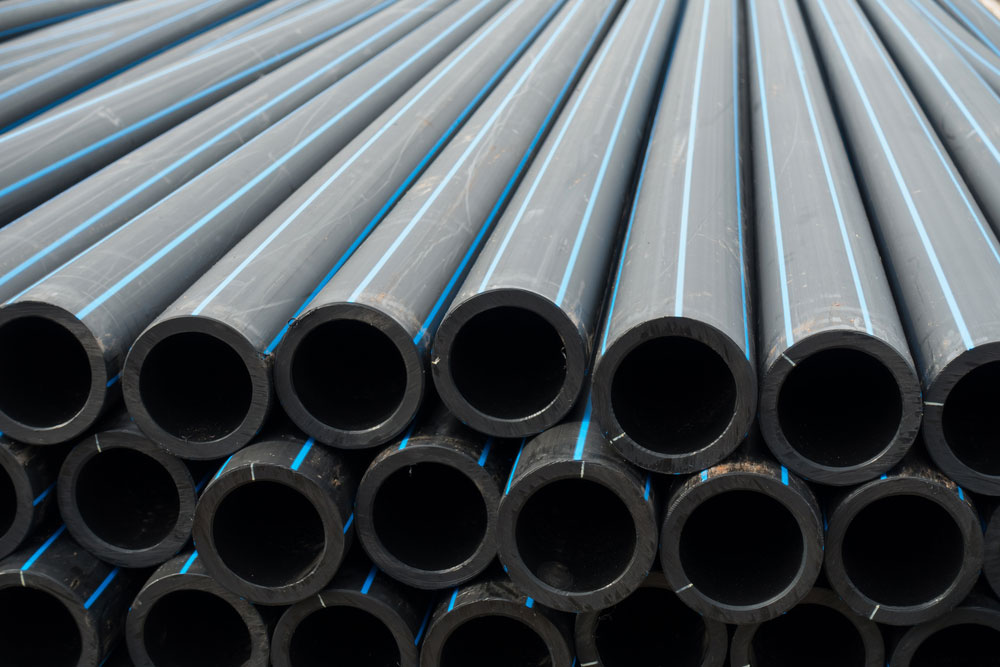Understanding the Trick Advantages of HDPE Pipeline for Water and Wastewater Administration
Using HDPE pipe in water and wastewater management offers numerous advantages that warrant factor to consider. Its exceptional durability and lengthy life-span make it a favored selection for many tasks. Furthermore, the product's resistance to corrosion and chemical damages improves its dependability in numerous settings. The benefits extend beyond simply longevity and resistance. hdpe pipe suppliers Midland TX. Discovering its cost-effectiveness and environmental influence exposes much more engaging reasons for its extensive adoption in contemporary infrastructure
Phenomenal Resilience and Durability

HDPE pipeline sticks out for its exceptional durability and durability, making it a favored selection in water monitoring systems. Constructed from high-density polyethylene, these pipelines can hold up against considerable pressure and tension, making sure trusted performance in time. Their robust nature permits them to withstand severe environmental conditions, consisting of temperature level variations and soil activities, which can cause other products to stop working.
The life-span of HDPE pipes frequently exceeds half a century, giving an economical option for districts and sectors alike. Additionally, the product's lightweight homes streamline installation, lowering labor prices and durations. This durability lessens the demand for frequent repair services or replacements, further boosting its economic appeal.
In water administration applications, the dependability of HDPE pipelines means fewer disturbances and enhanced service connection, making them important to lasting framework advancement. The mix of resilience and longevity solidifies HDPE's duty as a keystone in effective water administration remedies.

Resistance to Deterioration and Chemical Damages
While several materials succumb to deterioration and chemical damages gradually, HDPE pipes show exceptional resistance, making them suitable for different water monitoring applications. This durability comes from the molecular framework of high-density polyethylene, which is inherently non-reactive and does not corrode like metals or deteriorate from exposure to severe chemicals. As an outcome, HDPE is very efficient in settings with aggressive compounds, such as wastewater systems that might contain acids, bases, and natural solvents.
Additionally, HDPE pipelines can withstand environmental factors such as soil acidity and saline conditions, better boosting their suitability for diverse applications (Midland TX HDPE Pipe Fittings in Stock). Their ability to maintain structural integrity with time reduces the risk of leaks and failings, which is critical in ensuring the safety and security and dependability of water circulation and wastewater management systems. As a result, the resistance to deterioration and chemical damage significantly adds to the total efficiency and long life of HDPE piping remedies
Cost-Effectiveness and Economic Advantages
When considering the monetary ramifications of water monitoring systems, the cost-effectiveness of HDPE pipelines ends up being apparent. These pipelines use reduced installation and upkeep prices contrasted to standard products like steel or concrete. Their lightweight nature simplifies transportation and installment, leading to lowered labor expenses. In addition, HDPE pipelines display a lengthy life expectancy, commonly surpassing 50 years, which translates to less replacements and long-lasting financial savings.
Moreover, the resistance of HDPE to deterioration and chemical damages minimizes the need for expensive repairs and replacements. The pipelines useful site additionally support effective water circulation, decreasing power prices associated with pumping systems. By reducing leaks and water loss, HDPE pipelines add to significant financial advantages for towns and markets alike. Overall, the initial investment in HDPE piping can generate considerable monetary returns over the lifespan of the water administration system, making it a prudent choice for lasting infrastructure development.
Environmental Sustainability and Lowered Impact

Convenience and Adaptability in Installment
As a result of their unique buildings, HDPE pipes use exceptional convenience and adaptability in installation, making them ideal for a large range of applications. Their lightweight nature enables for simpler handling and transportation, reducing labor expenses and setup time. HDPE pipelines can be curved and shaped to fit numerous surfaces and job requirements, which is particularly advantageous in testing atmospheres.
Additionally, their resistance to corrosion and chemical damage permits installation in varied settings without the need for specialized safety finishings. The capacity to fuse joints creates a continuous, leak-free system, improving the total integrity and integrity of the setup. HDPE's flexibility also fits ground motion, minimizing the threat of damage in areas prone to shifting soil. In general, these qualities make HDPE pipelines not just versatile but additionally a favored selection for water and wastewater administration systems.
Often Asked Concerns
Just How Does HDPE Pipe Compare to PVC in Water Administration Applications?
HDPE pipeline supplies premium flexibility, resistance to deterioration, and resilience compared to PVC. Its lighter weight promotes simpler installment, while its lengthy lifespan decreases replacement prices, making HDPE a favored selection in water management applications.
What Is the Lifespan of HDPE Piping Under Typical Problems?
Under normal problems, HDPE pipelines can have a life-span varying from 50 to 100 years. Their toughness and resistance to corrosion add to their long-term efficiency in numerous applications, making them a reliable selection for infrastructure.
Are HDPE Pipeline Recyclable After Their Service Life?
Yes, HDPE pipes are recyclable after their life span. American Plastics sites HDPE Pipe Manufacturing. They can be processed and repurposed right into new products, substantially lowering environmental influence and promoting sustainability within the market, making them an eco-friendly option for piping options
What Is the Installation Process for HDPE Pipeline?
The installation process for HDPE pipelines includes website preparation, trenching, pipe fusion or mechanical joining, backfilling, and pressure screening. Correct strategies assure a long lasting and effective system for transporting water and wastewater properly.
Can HDPE Piping Be Made Use Of for Both Drinkable and Non-Potable Water Systems?
Yes, HDPE pipes can be made use of for both drinkable and non-potable water systems. Their convenience, durability, and resistance to rust make them appropriate for different applications, guaranteeing secure and effective transportation of water in various contexts.